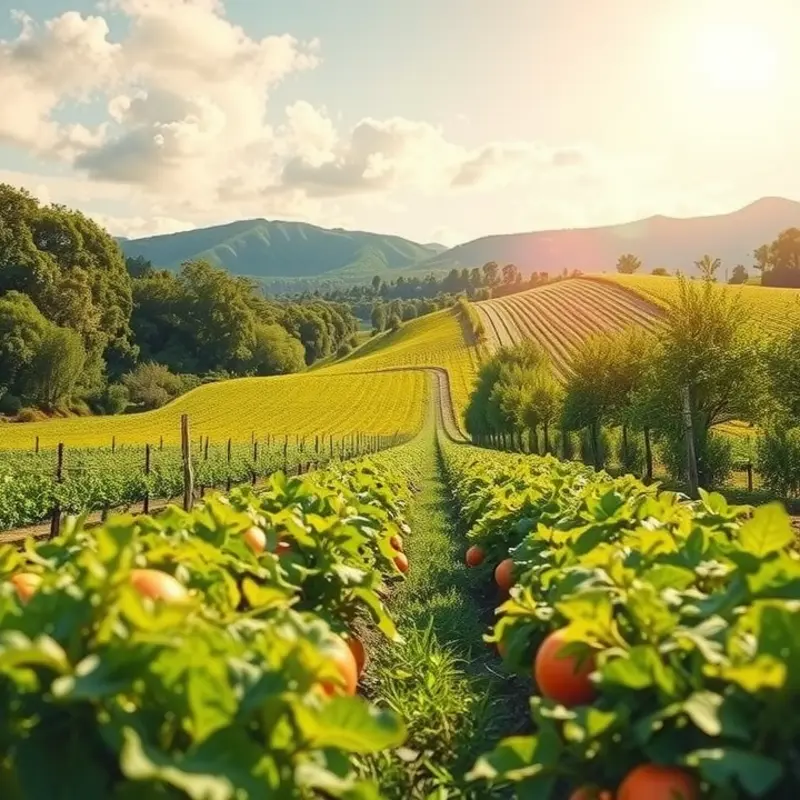Food choices play a critical role in climate action. By selecting sustainable options, environmentally-conscious individuals can make significant strides toward a healthier planet. This guide explores various strategies and foods that both nourish the body and support the environment, paving the way for a more sustainable future. Let’s delve into the delicious world of eco-friendly foods and their impact on climate change, empowering you to make informed choices in your daily diet.
The Power of Plant-Based Eating

Plant-based diets play a pivotal role in combating climate change by reducing greenhouse gas emissions and conserving natural resources. They offer a sustainable approach to food consumption, lessening the environmental impact associated with animal agriculture.
A plant-centric diet focuses on fruits, vegetables, whole grains, nuts, and legumes as dietary staples. These foods are not only environmentally friendly but also nutrient-dense, promoting overall health. Vegetables and fruits are rich in vitamins, minerals, and antioxidants, while legumes and nuts provide essential proteins and healthy fats.
Adopting plant-based eating can significantly decrease your carbon footprint. For instance, producing plant-based foods generally requires less water and land compared to animal products. By choosing a meal centered around whole grains like quinoa or brown rice, you support more efficient use of natural resources.
Incorporating plant-based foods into your diet doesn’t have to be complicated. Start by replacing meat with legumes, such as lentils or chickpeas, which are versatile and affordable protein sources. You can easily swap ground meat in your favorite recipes with lentils, which offer a similar texture and absorb flavors well.
Breakfast offers a perfect opportunity to begin integrating plant-based choices. Consider oatmeal topped with fresh berries and nuts, or a smoothie packed with leafy greens and a banana. These simple changes can transform how you begin your day, providing energy and nutrients without the environmental toll of animal agriculture.
For lunch and dinner, experiment with diverse recipes that celebrate plant flavors. Try stir-fried vegetables with tofu or a hearty vegetable stew. These meals not only satisfy hunger but also reduce reliance on carbon-intensive food production.
To enhance flavor without adding excess salt, explore natural flavor boosters such as herbs, spices, and umami-rich ingredients. More ideas can be found here. By choosing plant-based eating, you’re engaging in mindful eating practices that contribute to a sustainable world.
Opting for a plant-based diet supports both planetary health and personal well-being. As you incorporate more plant-based foods, you may also experience benefits like improved digestion, enhanced energy levels, and a reduced risk of chronic diseases. Each plant-based meal marks a positive step towards a healthier planet and a healthier you, showcasing the immense power of plant-based eating.
Local and Seasonal: The Eco-Friendly Food Movement

Buying locally and consuming seasonal produce are powerful steps toward reducing the environmental impact of your diet. When you choose products from nearby farms, you cut down on the fossil fuels burned during long-distance transportation. This shift not only minimizes carbon footprints but also promotes fresher, tastier food options.
Supporting local farmers ensures that the economic benefits remain within your community. It fosters a network where consumers and producers support each other. This system encourages sustainable agricultural practices, as local farms often prioritize biodiversity and environmental health. By choosing local, you help preserve farmland and foster a resilient food system.
Recognizing seasonal fruits and vegetables can be incredibly rewarding for both your palate and the planet. Seasonal foods are naturally ripened and harvested at their peak, offering better flavor and nutrition. To identify what’s in season, you might start by visiting your local farmers’ market. Farmers are excellent resources for understanding what’s currently being harvested in your area.
Farmers’ markets are more than just places to shop; they are community hubs where you can learn about sustainable agriculture and build connections with the people who grow your food. Opting for community-supported agriculture (CSA) programs is another great way to stay in tune with local seasons. CSAs provide scheduled deliveries of fresh products directly from farms, ensuring you receive a variety of seasonal produce throughout the year.
Planning meals around seasonal ingredients can enhance your culinary experience. Spring might bring a bounty of asparagus and strawberries, while autumn offers pumpkins and root vegetables. By adjusting your recipes to align with the seasons, you not only support local agriculture but also instill creativity in your cooking.
Further, there’s an aspect of reducing waste by focusing on locally sourced and seasonal foods. These products often require fewer preservatives or packaging, reducing landfill contributions. Eco-smart kitchen practices complement this further by ensuring that any produce you bring home is stored efficiently, reducing spoilage and waste.
By embracing local and seasonal eating, you engage in a vital aspect of the eco-friendly food movement. You contribute significantly to climate action not just through reduced carbon emissions but also by fostering a sustainable economy and enriching your community. This chapter of your sustainable journey doesn’t just reshape meals; it strengthens your connection to the local environment and food culture.
Final words
Making sustainable food choices is an essential step in the fight against climate change. By integrating more plant-based foods into your diet and sourcing produce locally and seasonally, you can contribute positively to the environment. Every meal presents an opportunity to make a difference; by choosing eco-friendly foods, you become an active participant in climate action. Celebrate and enjoy the diverse, delicious options nature has to offer while empowering yourself to live in harmony with the planet. Together, we can cultivate a sustainable future, one bite at a time.








